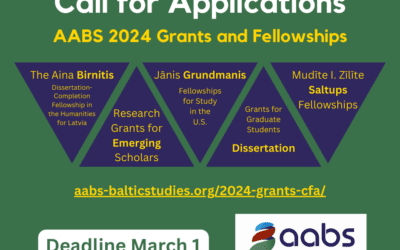The AABS Board is pleased to announce two 2022 recipients of the Undergraduate Paper in Baltic Studies Award: Zachary Egan, for his paper “The Impact of Polish Culture on the Formation of the Polish-Lithuanian Commonwealth in 1569,” and Ido Kons, for his paper, “A Weakened Crusade: Signs of Impending Crisis during the Tenure of Landmeister Burckhardt von Hornhausen of the Livonian Order.”
The AABS Undergraduate Paper in Baltic Studies Award of $250 recognizes academic papers on Baltic Studies based on originality, scholarship, excellence in writing, and quality of engagement with the subject area. Nominations were evaluated by the AABS 2020-2021 Undergraduate Paper Award Committee headed by Student Representative Kristo Nurmis.

©Zachary Egan, 2022
Zachary Egan was born in Šilutė, Lithuania and grew up in the United States, in New York City and near Boston, Massachusetts. He graduated with departmental honors and summa cum laude from the American University of Paris (AUP) in May 2022 with a Bachelor of Arts in History, Law & Society and a minor in International Law. He spent his last two years of university working on his thesis, which looked at how not only law and politics, but also culture, influenced the formation of the Polish-Lithuanian Commonwealth in 1569. In summer 2021, he was awarded a full scholarship from the Education Exchanges Support Foundation (Lithuania) to attend the summer Lithuanian language and culture course at Vilnius University. He currently lives in Paris, France where he works at the International Energy Agency, an organization within the framework of the Organisation for Economic Co-operation and Development (OECD).
Abstract of “The Impact of Polish Culture on the Formation of the Polish-Lithuanian Commonwealth in 1569″
In 1569, the Union of Lublin officially joined the Kingdom of Poland and Grand Duchy of Lithuania. The two states had already shared some political ties, such as a monarch, but the Union of Lublin not only affirmed this relationship but strengthened the political ties as well. Historians debate whether The Union of Lublin was the official start of the Polish-Lithuanian Commonwealth or if Lublin simply affirmed a political fact that the two states were already joined. Prior to the signing of the Union of Lublin, two other treaties, the Union of Horodło and Union of Krewo, had already created closer political connections between the two states. Further, after the Union of Lublin, there is some evidence that a process called “polonisation”—or the adoption of Polish cultures, customs, and practices became more commonplace in Lithuania.
Historical evidence, however, demonstrates that this process began to happen not after 1569, but hundreds of years before. Using Charles Tilly’s ideas of nation forming and the gravitational pull that cities have on nation-state creation, the cultural shifts from Poland to Lithuania that were strongly present prior to 1569 made Union of Lublin a consequence of “polonisation,” rather than a catalyst. The Unions of Horodło and Lublin placed Polish culture on the Lithuanian state in the form of religion and administrative practices, for example. Other examples of cultural domination from Poland include architecture, language, and legal structures.

©Ido Kons, 2022
Ido Kons started working on his undergraduate degree concurrently with high school. Passionate about history, he won the European Division of the International History Bee in 2019, and is graduating with honors from the University of Haifa’s Department of General History. He also has a passion for languages and encountering new cultures. His fascination for the medieval history of the Baltic States deepened during his studies, with a particular focus on the Crusading movement in Livonia and the emerging order of the Terra Mariana, and sees it as a period full of cultural and religious exchanges which continue to be relevant to date. Ido plans on pursuing further research on the medieval Baltic States in a postgraduate thesis.
Abstract of “A Weakened Crusade: Signs of Impending Crisis during the Tenure of Landmeister Burckhardt von Hornhausen of the Livonian Order”
The movements known collectively as the ‘Baltic Crusades’, which encompass the conquest and Christianization of the region by Central Europeans, have profoundly affected and shaped the history of Baltic States to this day. Historians have long analyzed their impact on both the society, culture, politics, and even the landscape of the eastern Baltic, from Prussia in the south to Estonia in the north. It was a period full of war and peace, conversion and conquest, cooperation and betrayal, which has also ingrained itself deeply within the nationalist narratives of modern times. One of the most impactful events within this period is known as the ‘Great Prussian Uprising’, which lasted from 1260 to the mid 1290s, and constituted the last stumbling block before the new state of affairs could be cemented. Previously pacified and converted natives turned their backs on the Crusaders, requiring a struggle of approximately thirty years to restore the peace in the newly named Terra Mariana, or ‘Land of Mary’. Many take the uprising to be an opportunistic revolt following the Livonian Order’s disastrous defeat at the Battle of Durbe (1260), in which the Landmeister Burckhardt von Hornhausen and over one hundred knights were killed by the Samogithians following a betrayal by their native allies.
Upon closer scrutiny, however, the disastrous defeat and the start of the uprising seems to be the culmination of several parallel processes of transformation and weakening which afflicted the Order in the late stages of the Crusade. My study examined the description of Landmeister Burckhardt von Hornhausen’s tenure as described in the Livonian Rhymed Chronicle (Livländische Reimchronik) and sought to suggest a new perspective of the events leading to the battle. The Chronicle is agreed by most historians to be a highly formulaic text, not only in structure but also in language. Divided based on the tenure of each Landmeister, it starts by praising the virtue of the incumbent using largely abstract terms, proceeds to narrate important events during their tenure, then cites their cause of death or reason for resignation. By studying the blatant peculiarities of Landmeister Burckhardt von Hornhausen’s tenure, several changes and weaknesses became apparent: these include the weakening of the Landmeister in relation to local commanders, the strive towards replicating an honorable conversion like that of King Mindaugas of Lithuania, a need to adapt towards ruling a vast native population, among others. It then becomes apparent that the Great Prussian Uprising did not stem from an unexpected disastrous defeat, but rather from lengthy underlying processes.
Other Grants and Fellowships News
Vanished Lands: Book Publication Subvention Report by Laima Vincė Sruoginis
The Association for the Advancement of Baltic Studies (AABS) is pleased to recognized the successful conclusion of a Book Publication Subvention Grant awarded to Peter Lang Publishers for publishing the book Vanished Lands: Memory and Postmemory in North American...
Elīna Vikmane Birnitis Fellowship Report on Advancing Cybermuseology
AABS is pleased to recognize Elīna Vikmane for the completion of her dissertation "Advancing Cybermuseology: Diffusion of digital innovation in Latvia’s museum sector," for which she received the 2022–2023 Aina Birnitis Dissertation-Completion Fellowship in the...
AABS 2024 Grant and Fellowship Applications Open
Call for Applications AABS 2024-2025 Grants and Fellowships Research Grants for Emerging Scholars The Aina Birnitis Dissertation-Completion Fellowship in the Humanities for Latvia Mudīte I. Zīlīte Saltups Fellowships Jānis Grundmanis Fellowships for...



